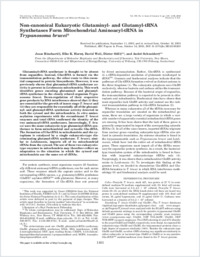Non-canonical eukaryotic glutaminyl- and glutamyl-tRNA synthetases form mitochondrial aminoacyl-tRNA in Trypanosoma brucei
- Rinehart, Jesse Departments of Molecular Biophysics and Biochemistry, Yale University, New Haven, USA
- Horn, Elke K. Zoology, Department of Biology, University of Fribourg, Switzerland
- Wei, David Departments of Molecular Biophysics and Biochemistry, Yale University, New Haven, USA
- Söll, Dieter Departments of Molecular Biophysics and Biochemistry, Yale University, New Haven, USA - Departments of Chemistry, Yale University, New Haven, USA
- Schneider, André Zoology, Department of Biology, University of Fribourg, Switzerland
-
16.10.2003
Published in:
- Journal of Biological Chemistry. - 2004, vol. 279, no. 2, p. 1161-1166
English
Glutaminyl-tRNA synthetase is thought to be absent from organelles. Instead, Gln-tRNA is formed via the transamidation pathway, the other route to this essential compound in protein biosynthesis. However, it was previously shown that glutaminyl-tRNA synthetase activity is present in Leishmania mitochondria. This work identifies genes encoding glutaminyl- and glutamyl-tRNA synthetase in the closely related organism Trypanosoma brucei. Down-regulation of their respective gene products by RNA interference showed that (i) they are essential for the growth of insect stage T. brucei and (ii) they are responsible for essentially all of the glutaminyl- and glutamyl-tRNA synthetase activity detected in both the cytosol and the mitochondria. In vitro aminoacylation experiments with the recombinant T. brucei enzymes and total tRNA confirmed the identity of the two aminoacyl-tRNA synthetases. Interestingly, T. brucei uses the same eukaryotic-type glutaminyl-tRNA synthetase to form mitochondrial and cytosolic Gln-tRNA. The formation of Glu-tRNA in mitochondria and the cytoplasm is catalyzed by a single eukaryotic-type discriminating glutamyl-tRNA synthetase. T. brucei, similar to Leishmania, imports all of its mitochondrial tRNAs from the cytosol. The use of these two eukaryotic-type enzymes in mitochondria may therefore reflect an adaptation to the situation in which the cytosol and mitochondria use the same set of tRNAs.
- Faculty
- Faculté des sciences et de médecine
- Department
- Département de Biologie
- Language
-
- English
- Classification
- Biological sciences
- License
-
License undefined
- Identifiers
-
- RERO DOC 4145
- DOI 10.1074/jbc.M310100200
- Persistent URL
- https://folia.unifr.ch/unifr/documents/299590
Statistics
Document views: 135
File downloads:
- Texte intégral: 226
